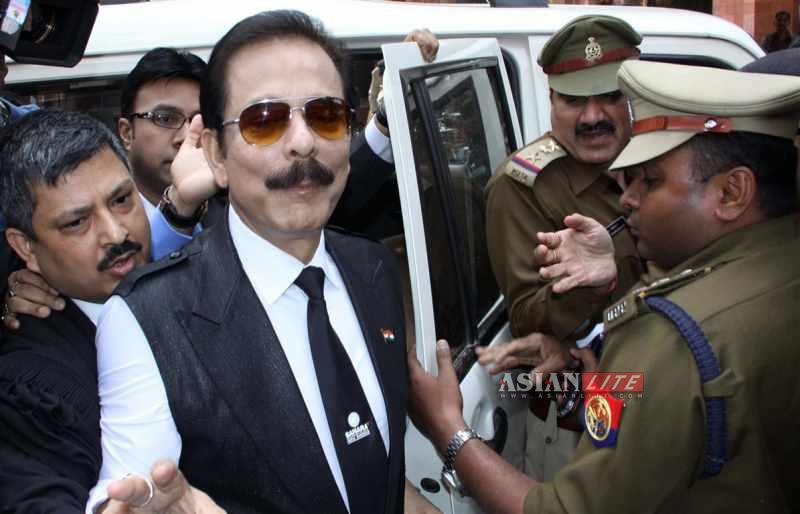Sahara group chief Subrata Roy will remain in jail even as the Supreme Court Wednesday lifted the freeze on the group’s moveable and immovable assets so it could raise Rs.10,000 crore for part repayment of investors money collected by two group companies.
A bench of Justice T.S. Thakur and Justice A.K. Sikri however said the money so generated will be deposited in an account opened by market regulator Securities and Exchange Board of India (SEBI).
“FDs, bonds and securities held by Sahara Group of companies may be encashed by the holders thereof subject to the condition that the maturity value/sale consideration of such FDs, bonds and securities shall be deposited in the designated bank account of SEBI,” the court said in its order.
The apex court March 26 said Sahara Group will deposit Rs.10,000 crore as part payment of investors’ Rs.24,000 crore that its two companies – SIRECL and SHICL – had collected through optionally fully convertible debentures (OFCDs) as a condition for the release of Roy and two other directors Ravi Shankar Dubey and Ashok Roy Choudhary in judicial custody since March 4.
Sahara India Real Estate Corporation Limited (SIRECL) and Sahara Housing Investment Corporation Limited (SHICL) had raised the money by issuing bonds in 2008 and 2009.
Soon after the pronouncement of judgment, senior counsel Srinivasan Ganesh urged the court to grant five days parole to Roy so that he could be with his ailing mother. The court asked him to file an application and it will pass an order after seeking SEBI’s response.
The court declined the plea by Roy and the other two that they be shifted to a guest house for continued custody till they comply with the court’s March 26 directions.
Pointing to the nature of the proceedings and the stakes involved, the court appointed senior counsel Fali Nariman as amicus curiae.
In Wednesday’s hearing, the court was told that FDs, bonds and securities worth Rs.2,421.67 crore would be worth about Rs.2,500 crores along with interest.
For mobilising the remaining Rs.2,500 crore of Rs.5,000 crores that Sahara has to give to SEBI in cash, the court permitted the firm to sell its immovable properties situated in nine different cities with a total worth of approximately Rs.2,500 crore.
However, in a rider, the court said that “such sales are not for a price lower than the estimated value indicated in the statement filed before this court or the circle rates fixed for the area in which such properties are situated”.
Ruling that the properties to be sold would not be purchased by any of Sahara’s entities, the judgment said: “The seller shall furnish to this court the details of the valuation of the properties sold and the terms of sales together with a declaration that the purchaser is not a related party qua Sahara.”
Upon deposit of the sale consideration, the title deeds of the property shall be released by SEBI in favour of the purchasers, the court said.
The court also permitted Sahara to charge (mortgage) its assets in Amby Valley in Pune, for purposes of furnishing a bank guarantee for Rs.5,000 crore.
However, it said the bank guarantee should be furnished from a nationalised bank or a scheduled bank only, not a co-operative bank.
It further said that if there is any shortfall in mobilising Rs.5,000 crore to be deposited in cash despite sale of FDs, bonds and securities and immovable properties located in nine cities across the country, then same could be met by the money raised by mortgaging the Amby Valley’s assets.
Regarding Sahara’s three off-shore properties – Grosvenor House Hotel in London and the New York Plaza and Dream New York hotels – the court said: “The question is left open to be determined after the requisite documents/information is made available by Sahara in terms of our order dated May 29.”
Pointing to the importance of the issues that need to be determined in the matter and the ramifications of the court’s directions, the court referred the matter to be heard by a three-judge bench to be constituted by Chief Justice R.M.Lodha.
